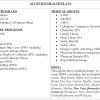How to Make Heart Health a Priority at Every Age and Boost Your Cardiovascular Health
- The Importance of Heart Health at Every Age
- Heart Health in Your 20s and 30s: Building a Foundation
- Heart Health in Your 40s and 50s: Prevention and Awareness
- Heart Health in Your 60s and Beyond: Maintaining Vitality
1. The Importance of Heart Health at Every Age
Heart health is one of the most crucial aspects of overall well-being, yet it's often overlooked until problems arise. The truth is, making heart health a priority should start early in life and continue through every stage of aging. From your 20s to your 60s and beyond, your heart requires regular attention and care to ensure its long-term health and functionality.
Cardiovascular diseases are the leading cause of death worldwide, but many of these diseases are preventable. By adopting heart-healthy habits, you can drastically reduce your risk of developing conditions such as coronary artery disease, high blood pressure, and heart attacks. The key is consistent, proactive heart care throughout life.
2. Heart Health in Your 20s and 30s: Building a Foundation
In your 20s and 30s, it's easy to feel invincible. However, this is the time to build a strong foundation for your heart health. The habits you form now can have a significant impact on your cardiovascular health in the future.
During these years, it’s essential to focus on maintaining a healthy weight, eating a balanced diet, and staying active. Cardiologists recommend regular physical activity—at least 150 minutes of moderate-intensity exercise per week, such as brisk walking, cycling, or swimming, to strengthen the heart.
Avoiding smoking, limiting alcohol consumption, and managing stress are also crucial for maintaining a healthy heart. Regular health check-ups can help identify risk factors such as high blood pressure or elevated cholesterol levels, which may go unnoticed until more severe heart issues arise later in life.
3. Heart Health in Your 40s and 50s: Prevention and Awareness
As you move into your 40s and 50s, your heart health requires more focused attention. This is the stage of life when cardiovascular problems often start to surface, especially if you haven’t prioritized heart health in your earlier years.
During these decades, it's vital to maintain the heart-healthy habits you've developed and to begin addressing any emerging risk factors. For instance, regular screenings for high blood pressure, cholesterol, and diabetes are essential. These conditions are closely linked to heart disease and should be managed effectively to prevent long-term damage.
Additionally, it's important to watch for any warning signs of heart issues such as unexplained fatigue, chest pain, or shortness of breath. Regular communication with your healthcare provider is key during this stage. If you haven’t already, consider incorporating heart-healthy foods into your diet, such as leafy greens, whole grains, and fatty fish rich in omega-3 fatty acids, to reduce inflammation and support healthy blood flow.
4. Heart Health in Your 60s and Beyond: Maintaining Vitality
In your 60s and beyond, maintaining heart health becomes more challenging due to the natural aging process, but it's far from impossible. With the right approach, you can continue to live a vibrant life with a healthy heart well into your golden years.
At this stage, it's important to continue with regular cardiovascular exercise, focusing on activities that improve both strength and flexibility. Low-impact exercises such as walking, yoga, or water aerobics are excellent for older adults. You may also want to engage in cognitive activities like meditation to manage stress, which can have a direct positive impact on heart health.
Diet also plays a significant role in maintaining heart health in your later years. Heart-healthy foods, rich in antioxidants, fiber, and healthy fats, can help reduce the risk of heart disease and promote overall well-being. Additionally, regular medical check-ups are essential for monitoring heart function and ensuring that any potential issues are detected early, allowing for timely intervention.
Many seniors also benefit from cardiac rehabilitation programs, which help improve heart function after a heart attack or surgery. These programs offer personalized exercise and lifestyle advice to help individuals stay active and reduce future risks.





















